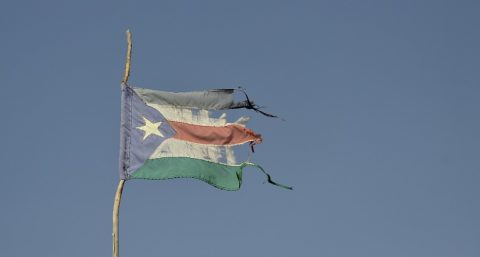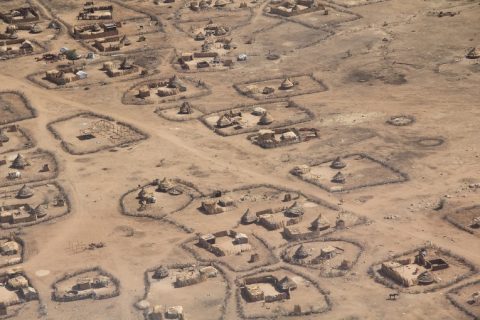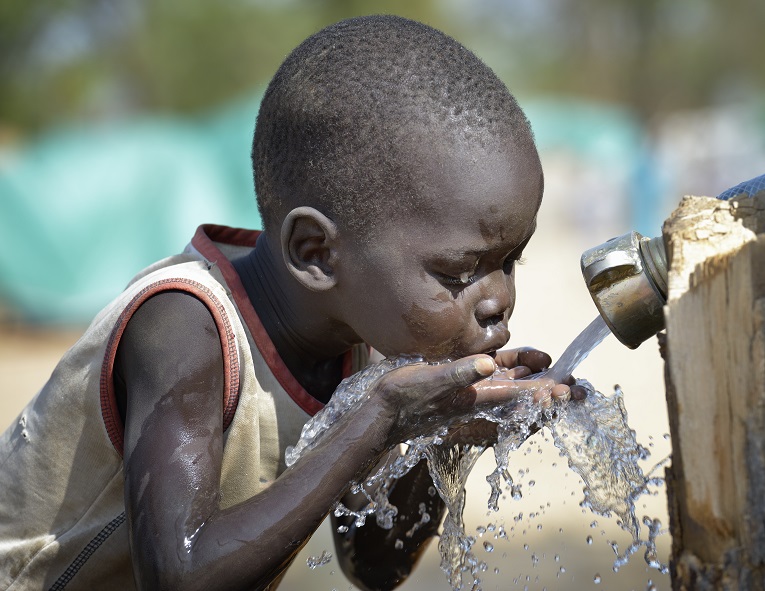War-torn South Sudan hit by another calamity – famine also looms in urban communities
People are dying from hunger in South Sudan as more than half of its population suffers from an urgent lack of food. The conflict has forced farmers to abandon their fields, and the cost of basic food commodities increase daily.
Text: Erik Nyström

The flag of South Sudan, a little worse for wear, flies over the market in the town of Alek. Photo: Paul Jeffrey / ACT Alliance
Africa’s worst war is entering its fourth year, but the situation only seems to get more dreadful.
A famine threatening a hundred thousand people’s lives was declared in parts of South Sudan in February, and a million more are considered to be at the brink of famine. The situation is described as man-made.
Because of the constant conflict, insecurity and displacement, people are unable to cultivate and produce food for themselves or for sale, FCA’s humanitarian program adviser Moses Habib explains.
For instance the Equatoria region has traditionally been the breadbasket of the country, producing a majority of consumable foods. Now it’s also been plunged into violence and can’t produce food items as before.
“Farmers have had to abandon their fields and stop planting and harvesting. There are agricultural villages that are now completely empty. No people are left, only wild dogs”, Habib says.
Potential spillover into FCA project locations
Late last year the UN warned that the violence in South Sudan might escalate into genocide. Armed groups kill people with machetes, burn down villages and gang rape women. Hate speech fuels the conflict, and there’s a fear that words lead to action.

Aerial view of rural village in South Sudan. Photo: ACT Alliance
On top of all this comes a famine, which by next summer might engulf 5,5 million people if nothing’s done.
Almost the same amount of people – more than 40 per cent of South Sudan’s population – are already in urgent need of food, agriculture and nutrition assistance. The drought that plagues Eastern Africa is also to blame for the severity of the crisis. FCA supports relief efforts in the region with a total of 150 000 euros, of which a third goes to food aid in South Sudan.
Famine has been declared in Unity state, which borders Jonglei state where FCA works. FCA’s field office in Fangak County is separated from Unity state only by the Nile River.
The beneficiaries of the ECHO financed project in Fangak have fled from Unity state during previous waves of conflict and insecurity.
“There is a likelihood of the famine spilling over to our project locations. We’re expecting that the numbers of internally displaced persons will keep rising”, says Habib.
“When people are hungry and do not see any assistance coming, they will start packing their belongings and walking in search of a place where they and their children can survive.”
Prices of goods are skyrocketing
According to Habib there are also visible signs of a looming famine among urban communities, including the capital Juba, where FCA’s country office is. The goods that are available in the markets in Juba are very few, and the prices have hiked up so much that most people don’t have enough money to purchase food.
The cost of living has risen exponentially across the country. Cereal prices have increased by more than 500 per cent in only a year. A staple food such as 3,5 kilo of maize grain now costs 1,200 South Sudanese Pounds (60 euros). Before the crisis erupted last summer it cost 110 SSP (5,50 euro).
Products such as bread, meat, tea and sugar have become luxury items that the average citizen cannot afford to buy. Four pieces of bread used to cost one pound (5 cents), but now one piece costs eight pounds (40 cents).
“As the cost of basic food commodities keeps increasing on a daily basis, most families are surviving on one meal a day or nothing”, Habib says.
“Quick action needs to be taken by the government and the international community to ensure that humanitarians are able to deliver lifesaving assistance without unnecessary impediments.”

A boy drinks water from a well in an internally displaced persons camp in Aweng, South Sudan. Photo: Paul Jeffrey / ACT Alliance